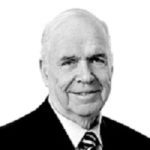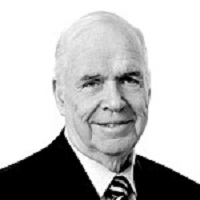
Aldous Huxley’s Brave New World was intended as satire but there is nothing satirical about the need for Canada to be brave in meeting the challenges of a dramatically changing world. The purpose of this book is to explain those changes and present ideas on how Canada should respond.
With the collapse of the Berlin Wall and then the Soviet Union more than twenty years ago, then-US president George H.W. Bush predicted that the world was on the cusp of a “New World Order.” To other pundits, in the memorable phrase of the American political scientist Francis Fukuyama, we had also reached “the end of history” with the collapse of the Soviet Union and communist regimes in Eastern Europe. At the time, there appeared to be no attractive alternative to western-style democracy and market economies and the values that go with both. Yet, in what is surely a relatively brief passage of time when measured by the broader sweep of history, much has changed in our world. We are neither at the end of history nor has a new world “order” emerged. In fact, there seems to be more chaos and turbulence than ever before.
China, which had quite self-consciously eschewed the Soviet model of glasnost and perestroika, but nonetheless embraced western-style capitalism under one-party rule, has risen to become the second largest economy in the world. The United States, which like a young and vigorous David stood over the fallen Soviet Goliath when the Berlin Wall came crashing down, has suddenly become the world’s “weary titan.” It is showing many of the symptoms of imperial decline and “overstretch” that Great Britain displayed at the end of the nineteenth century.
Europe, which picked itself up after the ravages of the Second World War and embarked upon one of the most ambitious strategic enterprises in history — political and economic consolidation leading to the formation of the European Union so that Europeans would never fight one another again — is faltering under the weight of massive public debt and the ravages of a serious financial meltdown that shows few signs of abating because the political will to drive needed policy solutions is simply not there.
In the triumphalism that accompanied the end of the Cold War little thought was given, save by a few Cassandras, to the threat posed to global stability by the unrelenting assaults from extremist Islamic factions, most evident in the 9/11 incidents but spreading ever since beyond Afghanistan through to the always volatile Middle East and North Africa. Although many left-wing critics at the time derided the great conservative American thinker, Samuel P. Huntington, his prediction in the mid-1990s that we were about to witness a “clash of civilizations” between the dark forces of Islamic extremism and the West proved to be singularly prophetic as Osama bin Laden and his al-Qaeda acolytes launched a day of devastating terrorist attacks on American soil on the key symbols of American prosperity and power.
These climactic events, and especially the financial meltdown and prolonged recession that began in the last decade, have had a deleterious effect on America’s capacity and inclination to lead on global challenges. They have shaken confidence, too, in the values of pluralism, liberty, and tolerance that underpin western-style democracies. Equally, they have diluted the tone and many of the sinews of US relations with key allies, including Canada. Personal relations at the top and the informal cooperative spirit among senior officials have suffered in the process as well. Relations may be correct, but they are no longer warm. The US approach to allies is now less magnanimous. In the absence of a single threatening power like the Soviet Union, the US feels that it no longer needs close allies and has begun to return to its pre-Wilsonian default of isolationism, or narrow self interest. No country is more affected by this change than Canada.
Canada is a place of comparative tranquillity, but that has more to do with geography and happenstance than the way we choose to protect our interests and influence.
While there is little evidence of a new order or that we have reached the “end of history,” what is palpable is that the tectonic geopolitical and economic plates of the world are shifting, setting in motion powerful forces that are shaking the postwar world to its very foundations.
Alas, there has been precious little analysis of what these changes mean for Canada, our place in the world, and our strategies for global engagement. Many pundits are caught in a time warp of the 1960s and 1970s. To some degree, Canadians can be forgiven for their lack of interest in international affairs because they have been fed a steady diet of bromides that suggest that Canada’s future is pinned to the fate of the United Nations, a liberal international order, and a benign and mostly satisfactory relationship with the United States. In the words of a well-known tourist commercial of the mid-1990s, Canadians have bathed themselves in the belief that “the world needs more Canada.” We seem to have convinced ourselves that we are a “land of tranquillity, safety and whales coming up for air in slow motion” and “a place to go for global spiritual renewal.” In truth, that was always fiction, not reality. Others have become smug because we weathered the severe economic depression better than most, albeit primarily on the back of strong demand for our commodities.
The rest of the world, including many of our close allies, views us, if anything, as cosseted and complacent. Yes, we are a place of comparative tranquillity, but that has more to do with geography and happenstance than the way we choose to protect our interests and influence.
Unlike many other countries, Canada faces few threats, existential or otherwise. We remain comfortable and protected within a North American cocoon. But even that may be less certain in our future than it was in our past.
During the Cold War, the Americans had no choice but to look after our security interests because we were their front door to a potential Soviet bomber and missile attack across the North Pole. In the Trudeau era, we could avoid paying our full dues in NATO (North Atlantic Treaty Organization) to defend western Europe because we knew that others would fill the gap. However, that didn’t always stop some of our leaders from lecturing our allies, including the Americans. Pretensions of moral superiority rang hollow in the absence of tangible commitments.
Photo: Shutterstock
Excerpted from Brave New Canada: Meeting the Challenge of a Changing World (Montreal: McGill-Queen’s University Press). © McGill-Queen’s University Press 2014. Used by permission.









